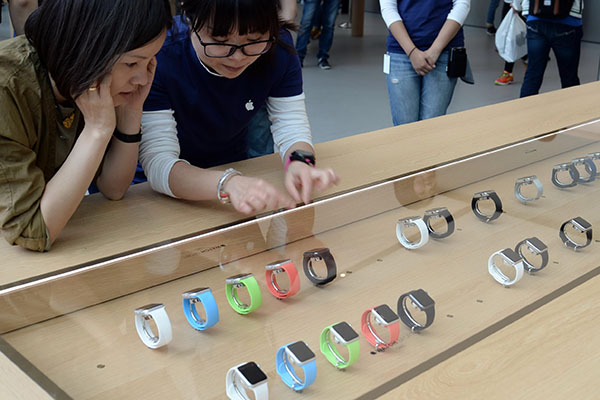
Customers choose smartwatches in an Apple Inc store in Hangzhou, Zhejiang province. (Photo/China Daily)
Apple Inc, the United States-based tech giant, has shipped nearly 7 million of its smartwatches worldwide since launching the device earlier this year, while Chinese vendors led by Xiaomi Corp made aggressive strides in the inexpensive wearables market, a new study said.
The study, released by research company Canalys on Thursday, said Apple was the only smartwatch maker to ship more than 300,000 units in the third quarter, followed by Pebble Technology Corp and Samsung Electronics Co Ltd.
Xiaomi, meanwhile, led the market by selling lower-end wearables in the quarter ended in September.
The company's 69 yuan ($11) step tracker Mi Band surpassed 10 million cumulative shipments during the quarter, according to Canalys. The majority of the products were sold inside the Chinese mainland.
"Aggressive pricing and frequent promotions have allowed Xiaomi to achieve ambitious sales targets, especially in China," the report said. It did not disclose Apple Watch shipments in the country.
The Chinese wearables market is a key priority for Apple, which is already making more than $12 billion in quarterly revenue in the country, boosted by strong iPhone sales.
Apple plans to set up more bricks-and-mortar shops in second-tier cities to unlock potential demand for its consumer products, including the Apple Watch.
Daniel Matte, an analyst from Canalys, said: "All eyes will be on Apple Watch sales during the holiday season as a barometer of the strength of the nascent smartwatch market."
He said after experiencing significant supply chain constraints earlier this year, Apple managed to overcome its production difficulties and is building momentum going into the fourth quarter. Apple also saw global shipments of its first-generation smartwatch steadily increasing.
But Apple is set to face challenges in China from Lenovo Group Ltd and Huawei Technologies Co Ltd in the high-end sector and from Xiaomi, which is luring Apple's potential, first-time buyers into becoming Mi Band users.
Huawei's smartwatch, long praised by the industry but not available in the market till a month back, is aiming to enter the Chinese market in the coming quarters.
Lenovo's star product, Moto 360, has already started selling in China. It was one of the first smartwatches to be available in the Chinese mainland market that runs on Google Inc's Android Wear operating system.
Xiaomi is working on its second-generation wearables with more features but at a lower price.
Lei Jun, Xiaomi's CEO, said earlier the Beijing-based company will keep updating its product line with inexpensive but good quality devices.
Jason Low, a Canalys analyst monitoring the Chinese wearables sector, said the market was extremely diversified and every player is seeking its own way of selling more products.
"An effective channel strategy will easily give a mid-sized vendor 100,000 units in quarterly shipment. Finding the right marketing plan becomes critical as the market remains young," Low said.
Vendors will continue to battle for position behind Apple in the rest of this year, he said, as a raft of new devices from various companies hits the market in the upcoming holiday season.


















































